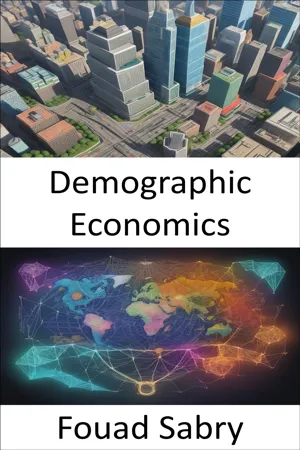
Demographic Economics
Unlocking Economic Destiny, Demographic Insights for a Prosperous Future
- English
- ePUB (mobile friendly)
- Available on iOS & Android
Demographic Economics
Unlocking Economic Destiny, Demographic Insights for a Prosperous Future
About this book
What is Demographic Economics
Economic analysis is used to demography, which is the study of human populations, including size, growth, density, distribution, and vital statistics. Demographic economics, sometimes known as population economics, is the application of economic analysis to demography.
How you will benefit
(I) Insights, and validations about the following topics:
Chapter 1: Demographic economics
Chapter 2: Economics
Chapter 3: Kenneth Arrow
Chapter 4: Natural experiment
Chapter 5: Methodological individualism
Chapter 6: tienne Laspeyres
Chapter 7: Information economics
Chapter 8: Liquidity preference
Chapter 9: Palgrave Macmillan
Chapter 10: Richard Kahn, Baron Kahn
Chapter 11: Vector measure
Chapter 12: Lawrence E. Blume
Chapter 13: Involuntary unemployment
Chapter 14: Peter Kenneth Newman
Chapter 15: Scarcity
Chapter 16: History of macroeconomic thought
Chapter 17: Ross Starr
Chapter 18: Non-convexity (economics)
Chapter 19: Convexity in economics
Chapter 20: Garett Jones
Chapter 21: Douglas Bernheim
(II) Answering the public top questions about demographic economics.
(III) Real world examples for the usage of demographic economics in many fields.
(IV) Rich glossary featuring over 1200 terms to unlock a comprehensive understanding of demographic economics. (eBook only).
Who will benefit
Professionals, undergraduate and graduate students, enthusiasts, hobbyists, and those who want to go beyond basic knowledge or information for any kind of demographic economics.
Frequently asked questions
- Essential is ideal for learners and professionals who enjoy exploring a wide range of subjects. Access the Essential Library with 800,000+ trusted titles and best-sellers across business, personal growth, and the humanities. Includes unlimited reading time and Standard Read Aloud voice.
- Complete: Perfect for advanced learners and researchers needing full, unrestricted access. Unlock 1.4M+ books across hundreds of subjects, including academic and specialized titles. The Complete Plan also includes advanced features like Premium Read Aloud and Research Assistant.
Please note we cannot support devices running on iOS 13 and Android 7 or earlier. Learn more about using the app.
Information
Table of contents
- Chapter 1: Demographic economics
- Chapter 2: Economics
- Chapter 3: Kenneth Arrow
- Chapter 4: Natural experiment
- Chapter 5: Methodological individualism
- Chapter 6: Étienne Laspeyres
- Chapter 7: Information economics
- Chapter 8: Liquidity preference
- Chapter 9: Palgrave Macmillan
- Chapter 10: Richard Kahn, Baron Kahn
- Chapter 11: Vector measure
- Chapter 12: Lawrence E. Blume
- Chapter 13: Involuntary unemployment
- Chapter 14: Peter Kenneth Newman
- Chapter 15: Scarcity
- Chapter 16: History of macroeconomic thought
- Chapter 17: Ross Starr
- Chapter 18: Non-convexity (economics)
- Chapter 19: Convexity in economics
- Chapter 20: Garett Jones
- Chapter 21: Douglas Bernheim
- Epilogue
- Appendix
- About the Author